
U2 are an Irish rock band from Dublin, formed in 1976. The group consists of Bono, the Edge, Adam Clayton, and Larry Mullen Jr.. Initially rooted in post-punk, U2's musical style has evolved throughout their career, yet has maintained an anthemic quality built on Bono's expressive vocals and the Edge's chiming, effects-based guitar sounds. Bono's lyrics, often embellished with spiritual imagery, focus on personal and sociopolitical themes. Popular for their live performances, the group have staged several elaborate tours over their career.
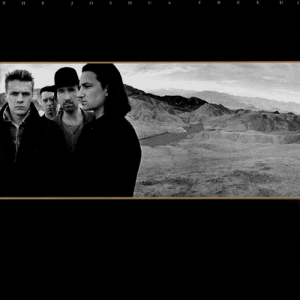
The Joshua Tree is the fifth studio album by Irish rock band U2. It was produced by Daniel Lanois and Brian Eno, and was released on 9 March 1987 on Island Records. In contrast to the ambient experimentation of their 1984 release, The Unforgettable Fire, the band aimed for a harder-hitting sound within the limitation of conventional song structures on The Joshua Tree. The album is influenced by American and Irish roots music, and through sociopolitically conscious lyrics embellished with spiritual imagery, it contrasts the group's antipathy for the "real America" with their fascination with the "mythical America".
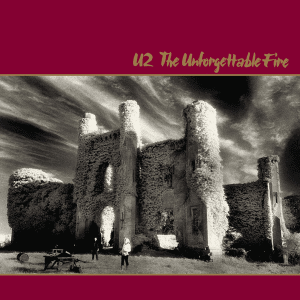
The Unforgettable Fire is the fourth studio album by Irish rock band U2. It was produced by Brian Eno and Daniel Lanois, and released on 1 October 1984 by Island Records. The band wanted to pursue a new musical direction following the harder-hitting rock of their previous album, War (1983). As a result, they employed Eno and Lanois to produce and assist in their experimentation with a more ambient sound. The resulting change in direction was at the time the band's most dramatic. The album's title is a reference to "The Unforgettable Fire", an art exhibit about the atomic bombing of Hiroshima.

"Stuck in a Moment You Can't Get Out Of" is a song by Irish rock band U2. It is the second track on their tenth studio album, All That You Can't Leave Behind (2000), and was released as the album's second single on 29 January 2001. The band's lead vocalist Bono has said the song was inspired by a fictional conversation with his friend Michael Hutchence about suicide. The song peaked at number 52 on the US Billboard Hot 100 and topped the charts in Canada, their native Ireland and Italy, while reaching the top 10 in Australia, Denmark, Finland, the Netherlands, Norway, Spain and the United Kingdom. In 2002, the song won the Grammy Award for Best Pop Performance by a Duo or Group with Vocal at the 44th Annual Grammy Awards ceremony.
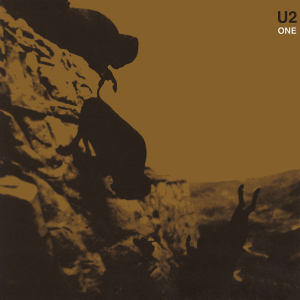
"One" is a song by Irish rock band U2. It is the third track from their seventh album, Achtung Baby (1991), and it was released as the record's third single in February 1992. During the album's recording sessions at Hansa Studios in Berlin, conflict arose between the band members over the direction of U2's sound and the quality of their material. Tensions almost prompted the band to break up until they achieved a breakthrough with the improvisation of "One"; the song was written after the band members were inspired by a chord progression that guitarist the Edge was playing in the studio. The lyrics, written by lead singer Bono, were inspired by the band members' fractured relationships and the German reunification. Although the lyrics ostensibly describe "disunity", they have been interpreted in other ways.

"With or Without You" is a song by Irish rock band U2. It is the third track on their fifth studio album, The Joshua Tree (1987), and was released as the album's lead single on 16 March 1987. The song was the group's most successful single at the time, becoming their first number-one hit in both the United States and Canada by topping the Billboard Hot 100 for three weeks and the RPM national singles chart for one week, with a further three weeks at number two.

"Beautiful Day" is a song by Irish rock band U2. It is the first track on their tenth studio album, All That You Can't Leave Behind (2000), and was released as the album's lead single on 9 October 2000. The song was a commercial success, helping launch the album to multi-platinum status, and is one of U2's biggest hits to date.

"I Still Haven't Found What I'm Looking For" is a song by Irish rock band U2. It is the second track from their 1987 album The Joshua Tree and was released as the album's second single in May 1987. The song was a hit, becoming the band's second consecutive number-one single on the US Billboard Hot 100 while peaking at number six on the UK Singles Chart.
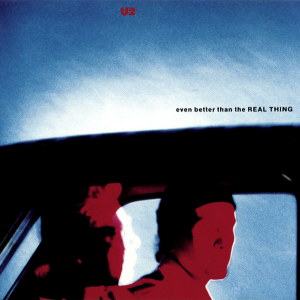
"Even Better Than the Real Thing" is a song by Irish rock band U2, and is the second track on their seventh album, Achtung Baby (1992). It was released as the album's fourth single on 8 June 1992, and it reached number three in Ireland and Canada while becoming a top-ten hit in Austria, New Zealand, and Sweden. A remixed version of the song released the same year peaked at number eight in the United Kingdom and number 10 in Ireland. In 1997, readers of Mojo named the song the 71st-best track of the 1990s.

"Vertigo" is a song by Irish rock band U2. It is the opening track on their eleventh studio album, How to Dismantle an Atomic Bomb (2004). It was released to radio as the album's lead single on 8 November 2004, and upon release, it received extensive airplay. The song was an international success, bolstered by its usage in a television advertisement featuring the band for Apple's iPod digital music player. The song lent its name to the band's 2005–2006 Vertigo Tour.

"City of Blinding Lights" is a song by Irish rock band U2. It is the fifth track on their eleventh studio album, How to Dismantle an Atomic Bomb (2004), and was released as the album's fourth single on 6 June 2005. It was produced by Flood, with additional production by Chris Thomas and Jacknife Lee. The song reached number one in Spain, and peaked in the top ten in Canada, Ireland, the United Kingdom, and several other countries. The music video was shot at the General Motors Place in Vancouver, British Columbia, Canada.

"Elevation" is a song by Irish rock band U2. It is the third track on their tenth studio album, All That You Can't Leave Behind (2000), and was released as the album's third single on 25 June 2001. The song became the band's 16th number-one single in their native Ireland and their second number one in the Netherlands. It also topped the charts in Canada and reached the top 10 in Australia, Denmark, Finland, Italy, Norway, Scotland, Spain, and the United Kingdom. A different mix of the song, entitled the "Tomb Raider mix", was included on the soundtrack of the 2001 film Lara Croft: Tomb Raider. In 2002, "Elevation" won the Grammy Award for Best Rock Performance by a Duo or Group with Vocal at the 44th Annual Grammy Awards ceremony. The song lent its namesake to the band's 2001 Elevation Tour.
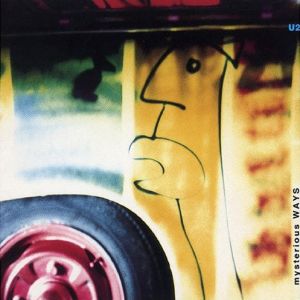
"Mysterious Ways" is a song by Irish rock band U2. It is the eighth track from their 1991 album, Achtung Baby, and was released as the album's second single on 2 December 1991. The song began as an improvisation called "Sick Puppy", with the band liking only the bass part that bassist Adam Clayton composed. The band struggled to build a song from it, with vocalist Bono and producer Daniel Lanois arguing intensely during one songwriting session. The song's breakthrough came after guitarist the Edge began experimenting with the Korg A3 effects unit. "Mysterious Ways" features a danceable beat, funky guitar hook, and conga-laden percussion, as well as mystical lyrics by Bono about romance and women.

"The Fly" is a song by Irish rock band U2. It is the seventh track from their 1991 album, Achtung Baby, and it was released as the album's first single on 21 October 1991. "The Fly" introduced a more abrasive-sounding U2, as the song featured danceable hip-hop beats, industrial textures, distorted vocals, and an elaborate guitar solo. Lead vocalist Bono described the song as "the sound of four men chopping down The Joshua Tree", due to its departure from the sound that had traditionally characterised the band in the 1980s.
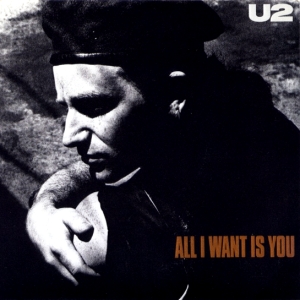
"All I Want Is You" is a song by Irish rock band U2. It is the final track on their 1988 album, Rattle and Hum, and was released as its fourth and final single on 12 June 1989. It also appears in the Rattle and Hum film, playing over the closing credits.
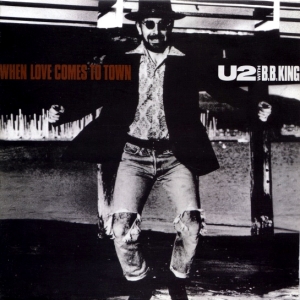
"When Love Comes to Town" is a song by Irish rock band U2 featuring blues guitarist B.B. King. It is the twelfth track from U2's 1988 album, Rattle and Hum, and was released in 1989 as the record's third single. The song was recorded at the historic Sun Studio in Memphis. "When Love Comes to Town" reached number one in the Irish Singles Chart, number six in the UK Singles Chart, number ten in the Dutch Top 40, and number two in the US Mainstream Rock Tracks chart.

"Desire" is a song by Irish rock band U2 and the third track on their 1988 album, Rattle and Hum. It was released as the album's lead single on 19 September 1988, and became the band's first number-one single in the United Kingdom and Australia. It reached number three on the Billboard Hot 100 in the United States, and topped both the Modern Rock Tracks and Mainstream Rock Tracks charts, making it the first song to reach number one on both charts simultaneously. It reached number two on the Dutch Top 40. At the 31st Annual Grammy Awards, "Desire" won the 1988 Grammy Award for Best Rock Performance by a Duo or Group with Vocal.

"Pride (In the Name of Love)" is a song by Irish rock band U2. It is the second track on the band's 1984 album, The Unforgettable Fire, and was released as its lead single in September 1984. The song was produced by Brian Eno and Daniel Lanois. Written about the American civil rights leader Martin Luther King Jr., "Pride" received mixed critical reviews at the time, but it was a major commercial success for U2 and has since become one of their most popular songs, as well as been re-evaluated positively by many as one of the greatest songs of all time. It appeared on the band's compilation albums The Best of 1980–1990 and U218 Singles and was reworked and re-recorded for Songs of Surrender (2023).

"The Ground Beneath Her Feet" is a song by Irish rock band U2. It appears in the 2000 film The Million Dollar Hotel, which was produced by U2 lead vocalist Bono, and the song was included on the film's soundtrack. Author Salman Rushdie is credited as the lyricist, as the words are taken from his 1999 book The Ground Beneath Her Feet. Written during the recording sessions for U2's album All That You Can't Leave Behind (2000), the song features Daniel Lanois, who played pedal steel guitar. A different mix from the soundtrack version appears in the film. "The Ground Beneath Her Feet" was released as a promotional single in February 2000, reaching number two on the US Billboard Adult Alternative Songs chart, number 22 in Canada, and number one in Iceland.

"Magnificent" is a song by U2. It is the second track on the band's 2009 album No Line on the Horizon and was released as the album's second single. The song was originally titled "French Disco", but was renamed later in the recording sessions. It is played before the start of every New York Rangers home game at Madison Square Garden.





















